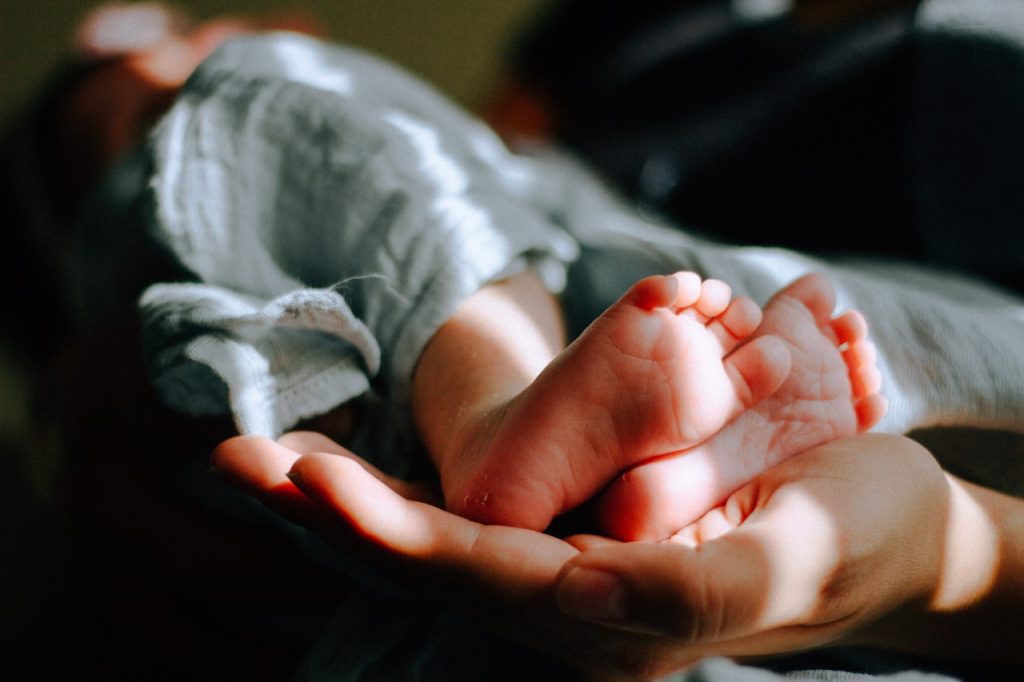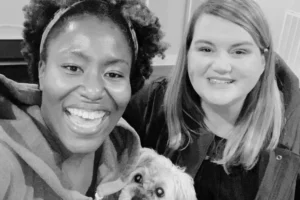“This is taking forever.” Eight-year-old Bryson reaches for the strap holding the plastic mask on his face. “I’m takin’ it off.”
“Don’t you dare,” warns his mom.
“Ms. Allie, this dumb mask smells!”
“So do you,” I tease him, checking the medication in the nebulizer. “But I’m keeping you around.”
“I’m feeling better. Way better.”
“Your asthma attack was pretty bad, kiddo. The medicine in the mask —”
“— Is called a bronchodilator, which helps me breathe. I know. It just stinks.”
I feel for him. I had childhood asthma too, so I know the treatments are a pain. But Christmas Eve in the ER is better than the alternative — not breathing.
“I should give you something to forget the smell,” I propose. “How about the sauerkraut-and-liverwurst sandwich from my lunch?”
“That’s DISGUSTING!” exclaims Bryson. But his face gives him away; he’s secretly delighted that I speak Grossness. It’s the universal boy language.
“I figured you’d love sauerkraut. How about dessert instead? Rotten bananas with maggot sauce.”
“NAAASTY!” says Bryson. “Is that really what’s in your lunch?”
“Maybe,” I say cryptically. “Or maybe … there are Christmas cookies with your name on them.”
Bryson looks up at me hopefully.
“Of course, they’re made with ground-up cockroaches —”
“MS. ALLIE!” He finally realizes I’m pulling his leg. “Do you have real cookies?”
I nod. “And it’s time for the mask to come off.”
I slide it off and slip my stethoscope into my ears. “Deep breaths, Bryson.”
Thankfully, he sounds better. I was worried about this kid who came in wheezing for air.
“Now, let me find those cookies.”
Bryson grins. His mom follows me into the hallway.
“Is he okay now?” she asks quietly.
“No worries.” I smile reassuringly. “He’ll be fine for Christmas.”
“You’re so good with him. We were here a month ago, and the nurse … well …”
I nod my head sympathetically. Some people don’t get eight-year-old boys.
“How old is your boy?” she asks.
There it is — the question that always comes, and the one I dread the most, because I can’t answer it without tearing up.
I force a smile: “Actually … I don’t have kids.”
“Oh.” She looks genuinely surprised. “I’m sorry; I assumed —”
“You’re fine. It’s fine.” I make myself smile again. “I’ll get the cookies.”
I rush off to the break room before she spots the tears.
* * *
When I was 16, I had a dream.
I was standing in a big room with billowy white curtains on both sides. Some things were vague — it was a dream, after all. But other details were incredibly clear. A man in a police uniform stood nearby, and an older woman in white was walking toward me. Four kids were playing around my feet while I cradled a fifth child, a newborn, in my arms.
When the woman approached, she spoke, but I couldn’t understand her words. I woke up before I could figure them out.
At the time, we’d just studied Joseph (of Technicolor Dream Coat fame) in youth group. Now it was almost Christmas, so baby Jesus was front and center. My teenage brain put the two together and decided this dream was a message from God: I’m going to have five children!
I looked up Gabriel’s appearance to Mary in the book of Luke. An angel … a person in white! I thought. And a message from God about a baby!
I read the story eagerly, and it seemed to confirm my interpretation. I knew I wasn’t going to give birth to the Messiah, but I could change the world by becoming a mom, just like I’d dreamed about since preschool.
I whispered aloud the words of Mary: “I am the Lord’s servant. May your word to me be fulfilled.” I even picked out names for my first two children — Joshua Alan for a boy and Grace Michelle for a girl.
That makes it pretty ironic that I now belong to an “Unrespectable Convent.” It’s what I named my house — the one I bought seven years ago with plans to fill it with a family. Instead, it’s been populated by an assortment of roommates.
The Convent received its name the night that my first roomie, Callie, got dumped by her boyfriend. She was drowning her sorrows in ice cream; I was trying to cheer her up. We’d reached the point where everything was funny — mostly because if we stopped laughing, we were going to cry.
She said, “I think we’ve taken vows of chastity without knowing it.”
“Yeah, who knew we’d end up belonging to a convent?”
“And an unrespectable convent at that!”
We started giggling and couldn’t stop. The Unrespectable Convent is what I’ve called my house ever since.
Of course, Callie found another boyfriend before long. Now she has a husband and two kids — or is it three? Meanwhile, I’ve seen a parade of girls join my convent just long enough to meet Mr. Right, while I’ve dated a total of two guys in my life, and one was in high school.
As my roommates moved out and got married, I became an honorary aunt to their kids, starting with Callie’s. I sent presents for birthdays and visited for baby cuddles. But that got harder as the years went by and my biological clock ticked louder.
Being an auntie wasn’t my only contact with kids; I also worked in pediatric nursing for eight years. I figured I could learn more about kids to be prepared when God fulfilled my dream.
But the year I turned 30, everything changed. It started when six-year-old Laila checked into our pediatric ward with a shattered leg. She was sweet and feisty and cute and liked me to put her long black hair in pigtails. She also tried to race other kids in her wheelchair almost as soon as she came out of surgery. Laila’s leg had been crushed by a car — her mother backed over it when she was drunk.
If you’ve ever worked with kids, you know there are a few you’d like to take home with you, and Laila was one of mine. I secretly hoped she’d stay with us for a while. The hospital had to be better than living with an alcoholic.
One morning while I was taking her blood pressure, Laila asked, “Ms. Allie, can I live with you? After I’m better?”
I started to say no, but she interrupted.
“Don’t worry, I know I can’t really.” Laila paused. “I bet you don’t drink, huh?”
I shook my head sadly.
“Mommy does,” Laila said quietly. “A lot.”
Even foster care will be an improvement for this girl, I thought. And maybe Mom will get sober in jail.
But for reasons I never understood, the cop who arrested Laila’s mom didn’t do a breathalyzer, which meant there was no evidence she was drinking. And my friend Ellie with the sheriff’s department told me Laila would’ve been hard to see from her mother’s car because of bushes near the driveway.
So when it was time for her to go home, Laila’s alcoholic mother is the one who picked her up. I couldn’t swear to it, but I think I smelled booze as her mom wheeled Laila to the elevator.
Laila gave me a funereal look: “Bye, Ms. Allie,” she said.
I couldn’t speak, but I tried to smile as I waved goodbye.
That night, God and I had a fight. I couldn’t stomach that he’d let this happen to a girl like Laila. Couldn’t understand why children were born to alcoholics but not to me. Couldn’t handle the pain of watching a girl I’d grown to love walk out of the hospital into a home that would scar her for a lifetime. Couldn’t keep believing in my dream when it was clearly teenage wishful thinking.
When the tears finally stopped, I stomped into my living room. I saw the pictures of my “honorary nieces and nephews” — Callie’s kids and the others — and couldn’t take it anymore. I pulled them off the tables and walls and dumped them in a box.
The next day, I put in for a transfer from the pediatrics ward to the ER.
“I’m sorry to see you go, Allie,” said my boss. “You’re so great with the kids …”
“Well, they’re not great with me anymore.”
She gave me a strange look, but let it pass.
It’s been three years since I left pediatrics. Three years since I gave up honorary aunthood. There’s still no boyfriend on the horizon, and honestly, I don’t talk to God as much as I used to. But working in the ER is easier than pediatrics.
Sure, a kid like Bryson comes in occasionally. But you can’t miss children as much when you rarely see them.
* * *
In a rural ER like ours, there’s a lot of hurry-up-and-wait. Yesterday, we had a guy with chest pain followed by a string of stomach flu cases that kept us busy the whole shift. Today, it’s the opposite: I was watching YouTube videos when Bryson showed up.
But right after I send Bryson home, everything changes. Five ambulances wail their way into the parking lot, and we hear about a multi-car pileup on I-80. One lady was airlifted straight to Iowa City. The rest of them — five adults, four kids — are here now. None of our patients are in mortal danger, but we have some serious injuries to patch up.
I go from YouTube videos to rushing around like a crazy lady. In our little ER, we only have one doctor working at a time, and Helene Kemper has her hands more than full. She barks lab orders and commands me to call another doctor — any doctor — who can come help.
While I’m ringing the inpatient units on my cell, my friend Autumn rushes over with the color drained from her face. She’s holding a bundle of blankets in her arms.
“Allie, where’s Dr. Kemper?”
“Try Exam 2 … are you okay?”
There’s a strange grunting sound within the bundle.
“Autumn, what … did you find a dog?”
But she’s already rushing toward Exam 2. “Get the incubator, okay?”
That’s when it hits me: She’s holding a baby.
I run to the storeroom so quickly I almost trip over my own feet and plug in our only incubator. Every exam room is full; we’ll have to put the infant right here —
Autumn and Dr. Kemper rush in. “How long was the baby lying there?” asks the doctor.
Autumn’s been a nurse for ten years longer than me, but this has clearly shaken her. “I don’t know,” she says. “In the restroom, when I walked into a stall —”
“On the floor?”
“Wrapped in a jacket. No sign of the mother.”
Autumn moves out of the way, and I catch my first look at the infant. He’s a bit longer than a ruler. His skin is a faint shade of blue, and his grunting breaths come at a frantic pace. That means underdeveloped lungs: No matter how hard he tries, the baby can’t get enough air.
Dr. Kemper’s checking vital signs and murmuring thoughts to herself.
“Should I try Dr. Ruiz?” I blurt. “He’s the OB on call —”
“Hang on,” barks Dr. Kemper. Translation: Let me finish. There’s no point calling a specialist if the baby won’t make it.
“Airlift?” I ask. “He should go to the NICU in Iowa City.” That’s the neonatal intensive care unit — the best chance for babies fighting for life.
Dr. Kemper pulls off her gloves and steps away with a sigh. I can read the prognosis like a book — this baby doesn’t have a chance.
“Maybe Dr. Ruiz will have ideas … or the NICU, they could …” I’m desperately making suggestions in stream of consciousness. “With a vent, and surfactant replacement —”
Dr. Kemper shakes her head, then turns to walk out.
“Dr. Kemper!” I cry her name desperately, willing her to change the prognosis, willing her to say we aren’t going to lose this tiny boy who shouldn’t even be outside the womb.
I almost add, but of course it’s ridiculous: Babies don’t die. Not on Christmas Eve.
Dr. Kemper turns abruptly. “Allie, that’s enough. There are patients out there who are going to live.”
She motions to Autumn and me to follow her back into the maelstrom of the ER, leaving the child alone in a storeroom for his final hour of life. That makes complete medical sense.
But it makes no human sense … not to me. As I look down again at the too-small body gasping in the incubator, an involuntary sob rises in my throat.
Maybe it’s my stifled sob, or the fact that Christmas is tomorrow, but something stops Dr. Kemper. Her face suddenly softens as she turns back to me.
“Allie … why don’t you keep him comfortable?”
I nod dumbly.
“Nobody out there’s going to die if you spend a few minutes with our foundling.”
* * *
I check the temperature on the incubator — not warm enough yet. I try to think of a way to help the baby breathe easier, even if he won’t take many breaths … but we don’t have equipment small enough for a three-pound preemie.
This child is a perfectly-formed human with wisps of black hair on his head and tiny scrunched eyes above flaring nostrils. But he’s simply too small: His fingers are maybe half the diameter of a pencil. He’s still covered in wet mucus from his birth.
Well, I could clean him up. I find some moist towelettes on a shelf and gently wipe, taking extra care with the tiny limbs.
Then I realize: The incubator isn’t going to do him much good, but infants respond to human touch. I carefully wrap him in the blankets Autumn left behind, and lift him into my arms.
He weighs nothing. It’s like holding a doll.
I gently stroke his face, the face writhing to inhale more air. “I can’t make you better,” I whisper, “but I love you, little man.”
I start to sing: “Jesus Loves the Little Children.” “Hush, Little Baby.” “Jesus Loves Me.” And “Baby Shark,” woman because it makes me laugh a little.
I know it doesn’t matter, but I give him a name, the name I’ve been saving since my dream: Joshua Alan.
“God loves you, Joshua,” I whisper. “Jesus, take him gently …”
I sing more songs. I rock Joshua slowly back and forth and stroke his head. Time stands still in the storeroom for Joshua and me.
As I finish a reprise of “Baby Shark,” I realize his breaths are coming less often. I look down to see one more rise and fall of his tiny chest.
Then … nothing.
I check with my stethoscope. No breath sounds.
I move to his heart. Silence.
Tears slide down my cheeks as I hold Joshua against my chest.
I don’t know how long I clutch this infant whose life ended far too soon. But at some point, I hear a gentle tap on the storeroom door.
“Allie?” Autumn opens the door hesitantly. “I’m so sorry, but Dr. Kemper … those four kids from the accident? They’re going nuts.”
* * *
I’m not really thinking clearly, which is why I step outside the storeroom still clutching Joshua.
I see a typical scene for a busy night: There’s a sheriff’s deputy talking to an accident survivor, and Dr. Kemper is walking towards me asking a brusque question I can’t hear, because one of the kids is crying while another tries to comfort him and two others swirl around the room like tiny tornadoes. My mind immediately shifts to what I can do to distract four kids and keep them from destroying the ER …
Until suddenly with a chill, it hits me. This is my dream. This is what I saw when I was 16.
The deputy is the man in a police uniform; Dr. Kemper is the woman in white. There are big loose curtains closing off the exam cubbies. Four children race around my feet … and in my arms, I’m holding the fifth.
It’s all there. The whole dream.
I finally make out Dr. Kemper’s words: “Allie, the kids from the accident are all fine, but they’re … well …” She motions at the madness. “Can you do something?”
As I nod assent and Dr. Kemper walks on to her next patient, one of the tiny tornadoes tugs at my scrubs.
“I’m Ana,” she announces. “Can I see the baby?”
I look down on a Latina girl, maybe five years old, gazing up at me with round eyes.
“I’m sorry, sweetie,” I say, “but the baby …”
My voice catches as Ana looks at me curiously.
“Well … he was born too soon.”
“Is he your baby?” Ana asks.
I take a deep breath. I’m not sure how to answer that one.
Finally, I find the words. “Yes,” I say. “Ana … this is Joshua Alan.”
* * *
After a moment, I have enough sense to take Joshua back into the storeroom and lay him in the unplugged incubator. I whisper a prayer as I stroke his head for the last time.
Then I take the four kids outside in the almost-empty parking lot, and we play tag on the plowed part, and throw snowballs on the unplowed part, and everybody gets thoroughly worn out. By the time I herd them back inside (because my fingers and toes are frozen), they’re ready to sit and watch cartoons with cookies I scavenge from the break room. My friend Ana, the youngest, falls asleep.
Finally, I sit down at a computer to chart the madness of my shift. I don’t know what to make of this day, and of my dream suddenly becoming life, and of Joshua dying in my arms. I definitely don’t know if I’ll ever have a husband, with babies we conceive and love together.
Still, I feel like I need to do something again, something with children, because … well, my life may have been easier for the past three years. But Bryson and Ana have shown me that it wasn’t better.
I can be — I don’t know what to call it — an “honorary aunt”? A “spiritual mother”? It’s what I was to Joshua for … well, for most of his life.
I finally log off the computer and get ready for the long drive to my folks’ house for Christmas morning. But before I step out into the snow, I pray the words of Mary again — not sure what will come of them, but meaning them with my soul.
“I am the Lord’s servant,” I whisper aloud. “May your word to me be fulfilled.”
Copyright 2018 George Halitzka. All rights reserved.












